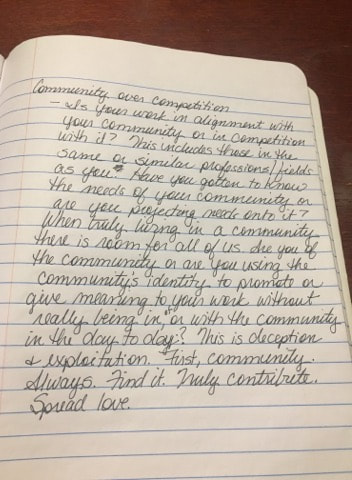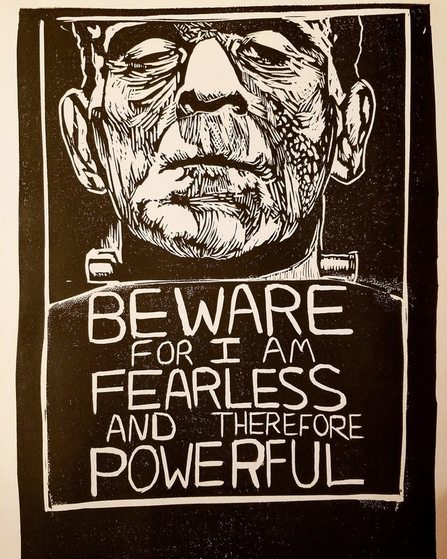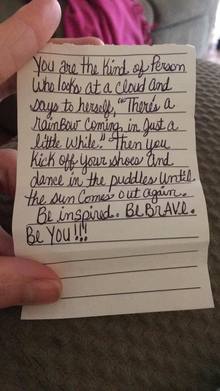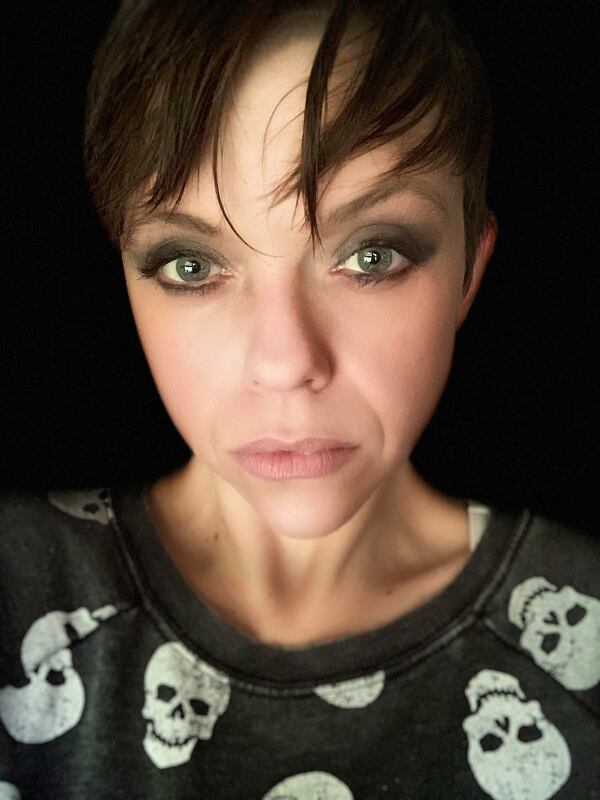In our most recent months, with the election of Donald Trump, scandals involving local professionals, violence in our region’s jails, and the publication of the book Hillbilly Elegy, there was created a vibe of high tension. Because Whitesburg (my hometown) is the location of the well- known and nationally respected arts and media non-profit – Appalshop, national media highlights my hometown in anything dealing with coal, Appalachia, rural poverty, working class, etc… because there’s easy access here. They can find people who both understand the community and the role that media plays in our society. National outlets ask these people to be liaisons between them and a world that outsiders cannot understand in the few days they spend on these stories. There are opportunities for those of us in the community to show this region for what it actually is by advocating when being interviewed by national media, and by creating media of our own. We can tack on the words “coalfields” and “Appalachia” to our jam, and get a whole different kind of attention for what we’re doing. If we’re smart, we can use this, well deservedly, to our advantage and benefit the community in much needed ways. However, as often, if not more often, the misuse of this two-sided coin can foster an ugly stink that divides and defeats the efforts of all community members and brings us to the point of a dysfunctional mess. What is a small town’s place in national movements like the ones I listed above? How do we recognize our shortcomings and work to better ourselves? Right now, in many ways, we are squandering opportunity when it comes to uniting the middle and younger generations of artists, musicians, and creative professionals to best serve this community. With all the knowing we have of one another, you’d hope that there would be communication that allows for mediation when conflict arises. That there would be benefit of the doubt. Efforts to lovingly teach one another when we have a bit of information or a way of looking at the world that hasn’t quite caught on here, but would be beneficial. Yet, the same knowing that would and should allow for such things also enables the environment for labeling, egos to be swollen and bruised, and for people to walk away without consequences for actions they should have to stand up and answer for. Sometimes, in such small towns, people choose not to look each other in the eye and talk a thing out, but instead to talk behind backs while smiling at faces and if not that ignoring and avoiding one another so that a conflict becomes abscessed and irreparable. What is our identity in the larger national conversation? How do we acknowledge the uniqueness of the place we live through the way we approach these conversations? What does our activism look like? What will our impact be on this national conversation, but more importantly, what will the impact of our actions be on our community? It’s often said that when something is experienced outside of here whether it be a trend in fashion, a new technology, or a change in the overall accepted collective mindset, that it takes a decade for it to become a thing in southeastern Kentucky. We’re 10 years behind “the times”. Yet, with increased access to the internet and smart phones, we seemed to have sped things up a bit. I still think we are a people very attached to principles and habits. Overall, we still like to hold our grudges and blame every judgment on “what the Lord said” rather than our own inability to bend our thoughts and make an effort to understand. The fact remains that we are a people slow to change. We like familiar things. Stepping into the unknown is hard, especially if you’ve seen little of the world outside of these hills without the filter of a TV screen. We like what has worked for our people for generations. We don’t like to get “above our raising”. God forbid our education make us appear that we feel we’re better than our neighbor who was educated differently. We’re not a people that will be forced into anything. You try to force us and we will resist if not outright fight you. So, how do we make change? A little at a time. How do we do it in a way that our community will embrace and support? We find advocates who have been and are deeply embedded in the community. They are the people the old folks can place with a few questions. They are the kids that grew up in the holler whose neighbor pissed in the creek and shit in the woods. The kids who avoided the toilet paper covered piles when they went traipsing up the hill. They are the people who are raising families here. The people whose brother is an addict, whose mother is losing a leg to diabetic ulcers, whose father is a displaced miner too indebted to retire, but too old to change careers. They are the people who go to church on Sunday for the hugs. They are the people with the emotional connection to the bulk population of the community. What else should these people possess though? The ability to process information. They make the effort to understand the information they receive and translate it to make it applicable in the community where they are. They don’t take the approach of “the movement” because they know it isn’t going to be effective in towns like mine. In fact, it will most likely slow down the progress. They are the people with the ability to see that all things exist in shades of gray and who in turn can love their neighbor enough to tactfully not make their bigotry worse, but to warm their neighbor to the ability to listen and learn better. That’s where change comes from, realize that we are first a community. Without you being a compassionate community member, change will not come. Every member has something to contribute, and every member that can evolve with the community is an asset. We have to meet each other where we are, otherwise we are reinforcing the fear of the unknown. If the unknown, or those who label themselves as the unknown or unfamiliar are unbending, impatient, or at worst verbally or physically violent about their cause, they’re just alienating the same people they’re trying to educate. You begin with labels like “us” and “them” and you are already dividing the community in ways that are hard to repair. For example, I still have a hard time trusting the type of person that in school labeled me a “freak” and “ugly” and made every day at school difficult. I see those same people in the community or those whose appearance cause me to label them as a person we referred to as “popular,” and I have to consciously remember to breathe, to be kind and not automatically defensive, to drop the labels, to recognize that not every person who appears that way and will maybe even turn their nose up at me at first, will do so if they are given the opportunity to know me. If they cannot be patient, I must be patient enough for us both.
It breaks my heart and makes me burn with anger. Because not only are these people and institutions shooting their selves in the foot, but they are making it hard for others to make any headway in important conversations that economically and socially struggling communities should be having, creating more labels to overcome. Seeing members of my community consider leaving simply because there is no effective mediation of conflict and because of the competitive mindset of the arts and culture segment of the community (as if there isn’t room for all of us) pushing them into a feeling of not belonging, I’m left wondering where I fit in as well.
When I start feeling this way, I come back to the example that the yoga classes currently being held and grown in the community offer. I teach some of them. There is a neutral space where the community comes together through the goal of well-being. Not religion or politics. Not competition or who’s who. Not grant funding, spinning, or administering. Not this label or that. Not competing for this business or money. Not gossip or drama. Just humans looking for a moment of peace and well-being - together. I know I fit in there and I see magic happen there. I firmly believe we have the resources within our communities to heal, to make change, to evolve and grow. I believe we can create our own opportunities. I believe we can find that neutral ground where magic happens. I believe there isn’t a need for competition that is not healthy competition. We definitely don’t need the toxicity created by the drama amongst our cultural work projects. I personally would trade the national outlet for the ability to not have to overcome the labels this drama has brought upon our community every time we try to integrate new ideas that have become associated with them. At the end of the day, I’m in my community. Before anything else, I’m from Letcher County, Kentucky. I have to live here. My work is here. The future of my children is being built here. The multiple outsiders that find their way here to make their impact for the better or worse are always tentative and fleeting unless they actually embed themselves in the community. The most effective and caring of them do. We should not bend to the outside influence, but we should learn from it. Learn and adapt to something we can use. Make it our own. Make it work for us. Make it community driven and resourced. We cannot be defined by what an outsider thinks we should be, nor the labels they create for their efforts and bring upon us. We have to stop the foolishness and the egotism if we want to survive effectively.
4 Comments
|
AuthorKelli Hansel Haywood is the mother of three daughters living in the mountains of southeastern Kentucky. She is a writer, weightlifter, yoga and movement instructor, chakra reader, and Reiki practitioner. Categories
All
Archives
September 2021
|




 RSS Feed
RSS Feed